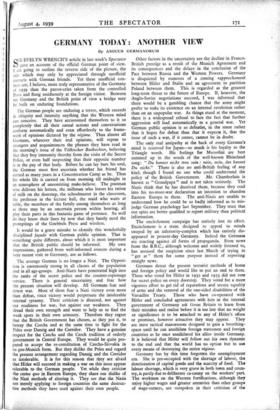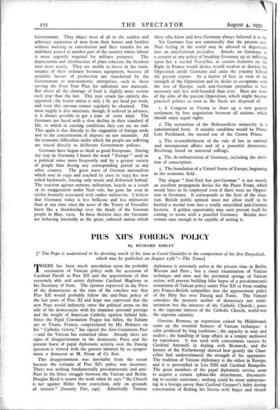GERMANY TODAY : ANOTHER VIEW
By AMICUS GERMANORUM
IR EVELYN WRENCH'S article in last week's Spectator gave an account of the official German point of view. am going to outline the reverse side of the picture, the side which may only be appreciated through unofficial contacts with German friends. Yet these unofficial con- tacts are, I believe, more truly representative of the Germany of 1939 than the parrot-cries taken from the controlled Press and flung assiduously at the foreign visitor. Between my Germany and the British point of view a bridge may be built on enduring foundations.
The German people are enduring a terror, which exceeds in ubiquity and intensity anything that the Western mind can conceive. They have accustomed themselves to it so completely that all their casual actions and conversations conform automatically and even effortlessly to the frame- work of opinions dictated by the regime. Thus almost all Germans, whatever their real opinions, will repeat to strangers and acquaintances the phrases they have read in the morning's issue of the Volkischer Beobachter, believing that they buy immunity thereby from the visits of the Secret Police, or even half suspecting that their opposite number is in the pay of that body. Before he can lay bare his soul, the German must first ascertain whether his friend has earned as many years in a Concentration Camp as he. Thus his whole life is carried on from morning till midnight in an atmosphere of unremitting make-believe. The postman who delivers his letters, the milkman who leaves his ration of milk on the doorstep, the schoolmaster in the classroom, the professor in the lecture hall, the maid who waits at table, the members of the family among themselves as long as there may be an uncertain person within hearing, all play their parts in this fantastic game of pretence. So well do they know their lines by now that they barely need the promptings of the Goebbels Press and wireless.
It would be a grave mistake to identify this wonderfully disciplined façade with German public opinion. That is something quite different, about which it is most important that the British public should be informed. My own impressions, gathered from well-informed sources during a very recent visit to Germany, are as follows.
The average German is no longer a Nazi. The Opposi- tion is enormously strong in all classes of the population and in all age-groups. Anti-Nazis have penetrated high into the ranks of the secret police and the counter-espionage service. There is general uncertainty and fear how the present situation will develop. All Germans fear and detest war. Most of them fear a Nazi victory even more than defeat, since victory would perpetuate the intolerable internal tyranny. Their criticism is directed, not against our readiness for war, but against our weakness. They dread their own strength and want to help us to find the weak spots in their own armoury. Therefore they regret that the British Government has chosen, as they put it, to betray the Czechs and at the same time to fight for the Poles over Danzig and the Corridor. They have a genuine respect for the Czechs and the Czech tradition of orderly government in Central Europe. They would be quite pre- pared to accept the re-constitution of Czecho-Slovakia in its pre-Munich form. But they dislike the Poles and regard the present arrangement regarding Danzig and the Corridor as intolerable. It is for this reason that they are afraid that Hider will succeed in making a war on this issue appear tolerable to the German people. Yet while they criticise the status quo in Eastern Europe, they share our dislike of the Nazi methods of altering it. They see that the Nazis are merely applying to foreign countries the same destruc- tive methods they have used against their own people. Other factors in the uncertainty are the decline in Franco- British prestige as a result of the Munich Agreement and its consequences and the delays in the conclusion of the Pact between Russia and the Western Powers. Germany is disquieted by rumours of a coming rapprochement between Hitler and Stalin and an agreement to partition Poland between them. This is regarded as the greatest long-term threat to the future of Europe. If, however, the Anglo-Soviet negotiations succeed, I was informed that there would be a gambling chance that the army might prefer to stake its existence on an internal revolution rather than on an unpopular war. As things stand at the moment, there is a widespread refusal to face the fact that further aggression will lead automatically to a general war. Yet German public opinion is so defeatist, in the sense rather that it hopes for defeat than that it expects it, that the issue of such a war, if it comes, cannot be in doubt.
The only real antipathy at the back of every German's mind is reserved for Japan—so much is his loyalty to the Triangle worth. His feelings for Mussolini are best summed up in the words of the well-known Rhineland song: "Du kannst nicht treu sein : nein, nein, das kannst Du nicht." There is also no anti-British feeling of any kind, though I found no one who could understand the policy of the British Government. Mr. Chamberlain is known as " Grandpapa " and is not taken seriously. The Nazis think that he has deceived them, because they read into his no-more-war declaration an intention to abandon Eastern Europe to them. The anti-Nazis are unable to understand how he could be so badly informed as to mis- judge German psychology last September. They trust that our spies are better qualified to report military than political information.
The encirclement campaign has entirely lost its effect. Encirclement is a stunt designed to appeal to minds swayed by an inferiority-complex which has entirely dis- appeared in present-day Germany. Indeed the Germans are reacting against all forms of propaganda. Even news from the B.B.C., although welcome and widely listened to, has aroused the suspicion since last March of trying to " get at " them for some purpose instead of reporting straight news.
Germans detest the present terrorist methods of home and foreign policy and would like to put an end to them.
Those who voted for Hitler in 1932 and 1933 did not vote for secret police on every doorstep. They voted for a more vigorous effort to get rid of reparations and secure equality of arms and the removal of the one-sided disabilities of the Versailles Treaty. Those who have co-operated with Hitler and concluded agreements with him in the internal government of Germany ask Great Britain to learn from their mistakes and realise before it is too late that no weight or significance is to be attached to any of Hitler's offers or promises, however attractive they may appear. They are mere tactical manoeuvres designed to gain a breathing- space until he can annihilate foreign statesmen and foreign countries as he once annihilated his allies inside Germany. It is believed that Hitler will follow out his own dynamic to the end and that the world has no option but to use every means of destroying the entire regime.
Germany has by this time forgotten the unemployment era. She is pre-occupied with the shortage of labour, the deterioration of capital goods and the scarcity of food. The labour shortage, which is very grave in both town and coun- try, is partly due to deliberate ca-canny on the workers' part. The workmen on the Western fortifications, although they enjoy higher wages and greater amenities than other groups of wage-earners, are outspoken in their criticism of the Government. They object most of all to the sudden and arbitrary separation of men from their homes and families without warning or consultation and their transfer for an indefinite period to another part of the country where labour is more urgently required for military purposes. The depreciation and obsolescence of plant concerns the business men more nearly. They are unable to invest in the main- tenance of their ordinary business equipment, because all available factors of production are transferred by the Government to non-economic enterprises, such as those serving the Four Year Plan for substitute raw materials. But above all the shortage of food is slightly more serious each year than the last. This year cream has entirely dis- appeared ; the butter ration is only + lb. per head per week, and even this amount cannot regularly be obtained. The meat supply is also uncertain, though, if ordered in advance, it is always possible to get a joint of some kind. The Germans are faced with a slow decline in their standard of life, to which in existing conditions they can see no end. This again is due directly to the stagnation of foreign trade and to the concentration of imports on raw materials. All the economic difficulties under which the people are suffering are traced directly to deliberate Government policies.
Germans have begun to think as good Europeans. During my stay in Germany I heard the word " Europe " used in a political sense more frequently and by a greater variety of people than during any corresponding period in any other country. The great wave of German nationalism which rose in 193o and reached its crest in 1933 has now rolled backwards, leaving only weeds and driftwood behind. The reaction against extreme militarism, largely as a result of its exaggeration under Nazi rule, has gone far even in circles formerly associated with junker militarism. I believe that Germany today is less bellicose and less militaristic than at any time since the news of the Treaty of Versailles burst like a thunderclap over the heads of the German people in May, 1919. In these decisive days the Germans are behaving internally as the great, cultured nation which those who know and love Germany always believed it to be.
Yet Germans fear not unnaturally that the present anti- Nazi feeling in the world may be allowed to degenerate into an anti-German prejudice. Attacks on Germany as a country or any policy of breaking Germany up or inflicting upon her a second Versailles, as certain elements on the Right in France would desire, would weaken or destroy the Opposition inside Germany and unite the country behind the present regime. As a matter of fact, in view of the strength of the Opposition and its desire to co-operate with the rest of Europe, such anti-German prejudice is less necessary and less well-founded than ever. Here are some of the aims of the present Opposition, which might become practical politics as soon as the Nazis are disposed of.
1. A Congress in Vienna to draw up a new general settlement by free negotiation between all nations, which should enjoy equal rights.
2. The restoration of the Hohenzollern monarchy in a constitutional form. A suitable candidate would be Prince Luis Ferdinand, the second son of the Crown Prince.
3. The re-establishment of the rule of law in national and international affairs and of a powerful democratic Reichstag, based on universal suffrage.
4. The de-militarisation of Germany, including the aboli- tion of conscription.
5. The foundation of a United States of Europe, beginning in the economic field.
The slogan " Anti-Nazi but pro-German " is not merely an excellent propaganda device for the Peace Front, which would have to be employed even if there were no Opposi- tion in Germany. It corresponds to the facts of the situa- tion. British public opinion must not allow itself to be hustled a second time into a totally unjustified anti-German hysteria. A golden opportunity may soon present itself for coming to terms with a peaceful Germany. Britain must remain sane enough to be capable of seizing it.









































 Previous page
Previous page